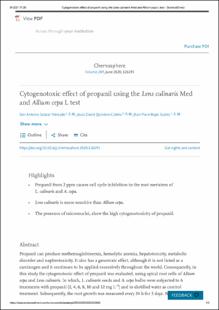Cytogenotoxic effect of propanil using the Lens culinaris Med and Allium cepa L test
Artículo de revista
2020-06
Chemosphere
Londres, Reino Unido
Propanil can produce methemoglobinemia, hemolytic anemia, hepatotoxicity, metabolic disorder and nephrotoxicity. It also has a genotoxic effect, although it is not listed as a carcinogen and it continues to be applied excessively throughout the world. Consequently, in this study the cytogenotoxic effect of propanil was evaluated, using apical root cells of Allium cepa and Lens culinaris. In which, L. culinaris seeds and A. cepa bulbs were subjected to 6 treatments with propanil (2, 4, 6, 8, 10 and 12 mg L−1) and to distilled water as control treatment. Subsequently, the root growth was measured every 24 h for 3 days. Next, the mitotic index and cellular anomalies were determined. Whereby, decreased root development was observed in all treatments. Likewise, greater inhibition of mitosis was evidenced in L. culinaris compared to A. cepa. In addition, chromosomal abnormalities, such as nucleus absence, sticky chromosomes in metaphase and binucleated cells, were present in most of the treatments. Thus, the presence of micronuclei and the results of L. culinaris, indicate the high cytogenotoxicity of propanil and the feasibility of this species as bioindicator
Descripción:
Cytogenotoxic effect of propanil using the Lens culinaris Med and Allium cepa L test.pdf
Título: Cytogenotoxic effect of propanil using the Lens culinaris Med and Allium cepa L test.pdf
Tamaño: 236.7Kb
 PDF
PDF
 LEER EN FLIP
LEER EN FLIP
Título: Cytogenotoxic effect of propanil using the Lens culinaris Med and Allium cepa L test.pdf
Tamaño: 236.7Kb
 PDF
PDF
 LEER EN FLIP
LEER EN FLIP
















